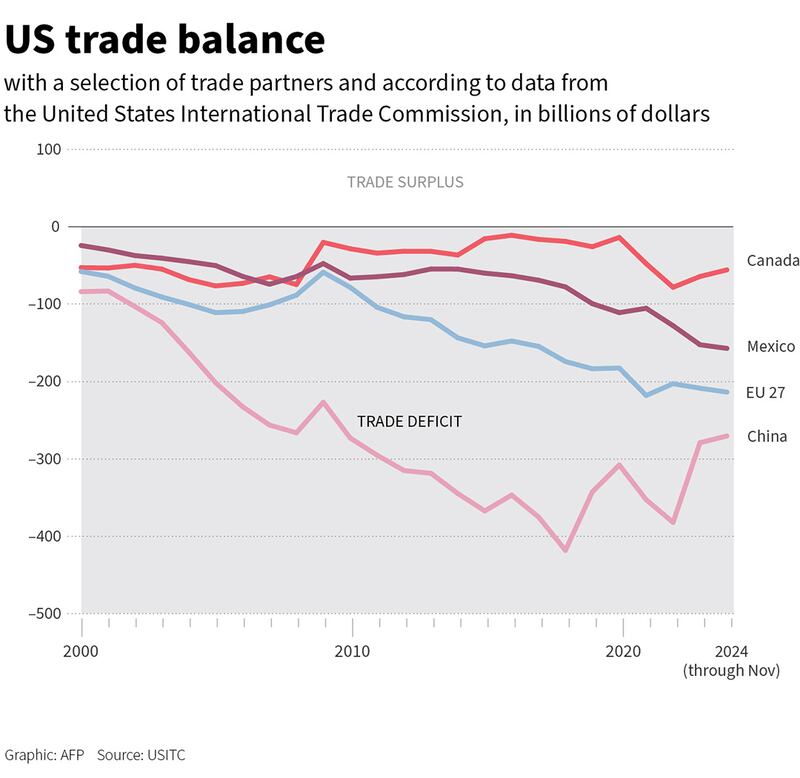U.S. tariffs on Chinese, Mexican and Canadian goods took effect Tuesday, with Beijing moving swiftly to retaliate with tariffs of its own on American agricultural and food products while accusing the United States of “bullying.”
Tariffs of 25% on Mexican and Canadian goods took effect after last month being postponed by President Donald Trump, with a 10% tariff on Chinese goods that took effect last month being doubled to 20%.
In response, China will impose additional tariffs of 15% on chicken, wheat, corn and cotton from the United States starting March 10, the Customs Tariff Commission of the State Council said in a statement.
A 10% levy will also be imposed on sorghum, soybean, pork, beef, aquatic products, fruits, vegetables and dairy products, the agency said.

Chinese Foreign Ministry spokesperson Lin Jian said the retaliatory tariffs were a “legitimate and necessary” response.
“The U.S. once again hiked tariffs on Chinese imports citing the fentanyl issue as an excuse ... [and has] smeared and shifted blame onto China, and pressured and blackmailed China,” Lin told a news briefing in Beijing on Tuesday. “The Chinese people have never been swayed by fallacies, deterred by intimidation, or cowed by bullying.”
Trump last month imposed the 10% tariff on Chinese imports in retaliation for what he said was Beijing’s refusal to stop the outflow from China of precursors for the synthetic opioid fentanyl. U.S. officials blame fentanyl for tens of thousands of deaths each year.

Beijing then introduced a 15% retaliatory tariff on certain U.S. energy exports to China. Last week, Trump warned he would ramp that rate up a further 10% on March 4. As a presidential candidate last year, Trump vowed tariffs of “more than” 60% on Chinese imports.
China claims progress on fentanyl
Lin, the Chinese foreign affairs ministry spokesperson, said that Beijing had already taken strong measures to help curb fentanyl.
“We urge the U.S. to stop being domineering and return to the right track of dialogue and cooperation at an early date,” he said.
U.S. Secretary of State Marco Rubio last week suggested Beijing may be “deliberately” flooding America with the synthetic opioid fentanyl, in a “reverse” form of the mid-1800s Opium Wars that enfeebled China’s international standing.
In a white paper on fentanyl issued on Tuesday, China’s State Council Information Office said the country had “achieved remarkable results” in the battle against the drug and its precursor chemicals, citing an ongoing crackdown on online sales of synthetic opioids and their precursors.
“As of June 2024, more than 140,000 illegal advertising information have been blocked and deleted, and 14 online platforms have been closed for rectification,” the document said, adding that there are “strict” export licensing controls for five listed fentanyl precursors.
Beijing’s response to Trump’s tariffs has also gone beyond just instituting its own retaliatory tariffs.
China’s Ministry of Commerce said it would add 15 U.S. entities including defense contractor Leidos to its export control list with immediate effect, to “safeguard national security,” the Global Times newspaper reported.
Beijing separately added 10 U.S. firms to its “unreliable entity” list, citing their involvement in the affairs of the self-governing island of Taiwan, which is claimed by the China’s government as its territory.
Joseph Ngan, a former assistant controller at Hong Kong’s i-CABLE News, said China has been hard-hit by tariffs under the Trump administration.
“A lot of reports are indicating that companies in mainland China, particularly exporters, have been greatly affected,” Ngan told RFA Cantonese in an interview on Monday. “A lot of them are looking for lawyers to find ways to get around tariffs, including moving production lines to Malaysia, Vietnam and other places.”
“Some are even considering setting up factories in the United States,” he added.
But the imposition of U.S. tariffs on goods from other countries like Mexico would make them harder to circumvent, Ngan said, by cutting off a potential alternate manufacturing location for China’s exporters.
Translated by Luisetta Mudie. Edited by Alex Willemyns.



